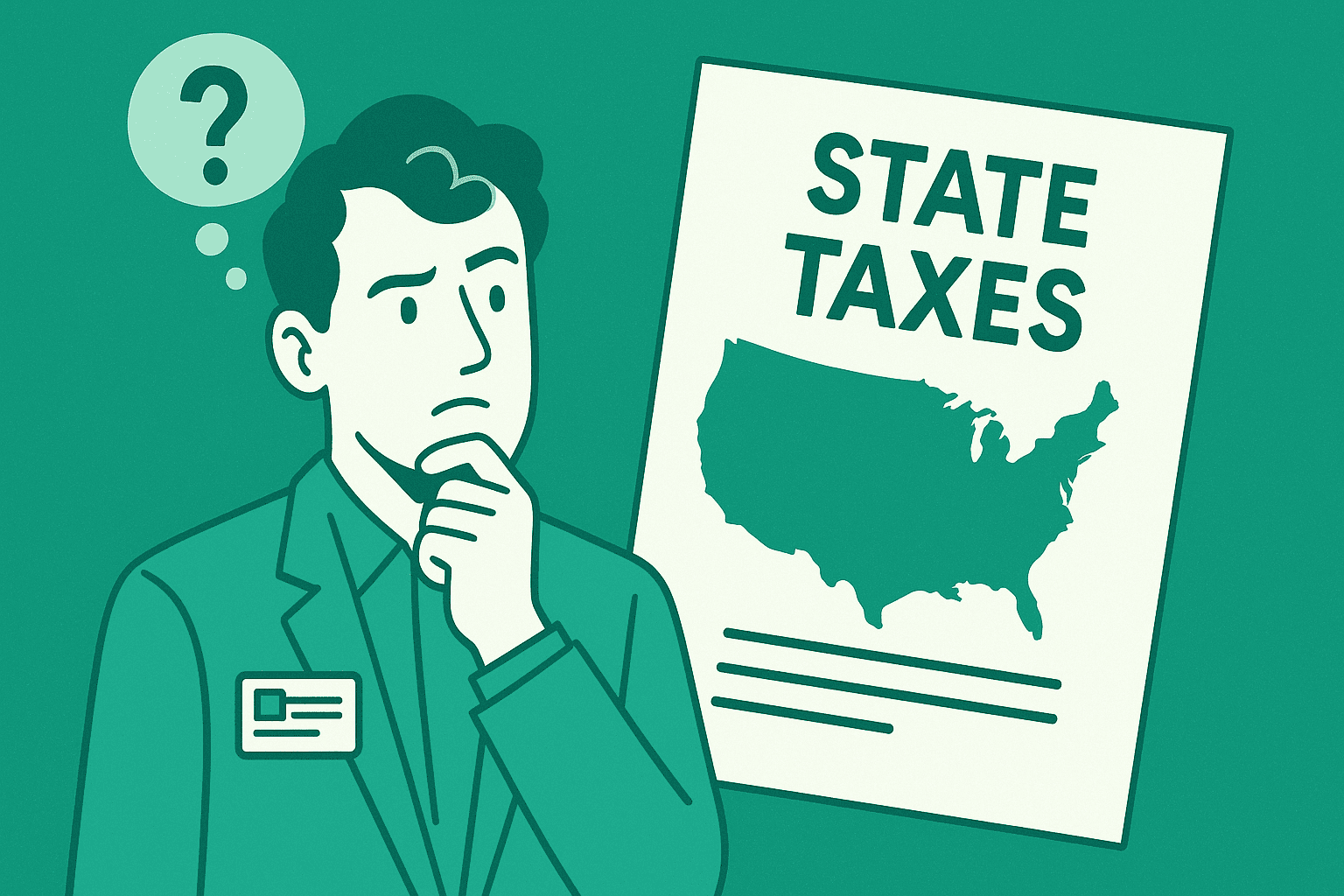Do expats pay state taxes?

For U.S. citizens living abroad, understanding your tax obligations goes beyond just federal income taxes. While the federal government taxes your worldwide income, state taxes can add another layer of complexity—especially since expats pay state taxes depending on their state of residency and ties.
Even if you qualify for the Foreign Earned Income Exclusion to reduce your federal tax liability, this benefit doesn’t always apply to state taxes. Each state has its own tax laws and residency rules, so it’s crucial to know whether you still need to pay state tax while living abroad. Failing to address your state tax obligations can lead to double taxation and unexpected tax bills.
Do expats pay state taxes?
Most of the time.
If you’re still a resident/domiciliary of a taxing state, expect tax on worldwide income.
If you’re a nonresident, you’re generally taxed only on income sourced to that state (e.g., rent from property located there).
What decides whether a state can tax me?
Two hooks:
- Domicile/residency: Your permanent legal home. States use this to determine your tax residency and whether you are a state resident for tax purposes. Residents are taxed on worldwide income.
- Statutory residency (some states): e.g., New York treats you as a resident if you keep a permanent place of abode and spend ≥184/183 days there—even if your domicile is elsewhere. Maintaining tax ties, such as a permanent place of abode, can result in being treated as a state resident for tax purposes.
Which states tax expats?
- States where you can claim non-residency (i.e., generally non-sticky; as a nonresident, they tax only in-state income): Colorado, Connecticut, Delaware, Massachusetts, Minnesota, Missouri, North Dakota, Oregon, Pennsylvania, Virginia, West Virginia.
- States that will tax people living abroad if they haven’t switched domicile: Alabama, Arizona, Arkansas, California, Georgia, Hawaii, Idaho, Illinois, Indiana, Iowa, Kansas, Kentucky, Louisiana, Maine, Maryland, Michigan, Mississippi, Montana, Nebraska, New Jersey, New Mexico, New York, North Carolina, Ohio, Oklahoma, Rhode Island, South Carolina, Utah, Vermont, Wisconsin.
Which states do not tax expats?
Alaska, Florida, Nevada, South Dakota, Tennessee, Texas, Washington, Wyoming, and New Hampshire (NH fully repealed its interest & dividends tax effective Jan 1, 2025).
Note: Washington still has a capital-gains excise tax despite no wage income tax.
Do states tax personal worldwide income or just “expats”?
States tax people, not labels. Residents are taxed on all taxable income, including foreign income; nonresidents are taxed only on in-state-source income. (Exception: South Carolina has an unusual base—see below.) Some states may have specific rules about how foreign income is treated for state tax purposes.
How do I change domicile away from a taxing state?
Three steps: abandon the old, establish the new, prove intent.
To successfully transition to a new state, you need to complete several tasks:
- Close out any housing arrangements, IDs, and benefits associated with your old state.
- Surrender your old state driver's license.
- Address any rental properties you own in the old state, as maintaining them can create significant tax obligations.
- Obtain a new driver's license or ID in your new state (Florida recommended).
- Register to vote in your new state.
- Update your vehicle registration and insurance to reflect your new state address.
- Use your new state address in all relevant documentation and communications.
- Keep your day count low in the old state, being mindful of residency rules such as California's presumption for staying longer than nine months or New York's statutory residency test.
Following these steps will help you establish residency in your new state.
Is establishing residency in Florida the cleanest path?
Yes. Florida has no personal income tax and no minimum stay requirements. Typical evidence includes a Declaration of Domicile(Fla. Stat. §222.17), FL driver’s license/ID, voter registration, vehicle/insurance moved, and consistent use of a Florida residential address for banking, IRS, employment, and estate documents.
If you own a home, consider Homestead (separate rules).
What if I work remotely for a New York or New Jersey employer while living abroad?
Beware convenience-of-the-employer rules. NY can source your wages to NY if you’re remote for your convenience (not employer necessity). NJ adopted a reciprocal version in 2023 that applies when the other state has a similar rule (e.g., NY/DE/NE). Plan your documentation around employer necessity to reduce double-tax risk.
If I become a nonresident, do I still owe state taxes on anything?
Usually yes—on state-source income only: e.g., rent from property in the state, apportioned business income, or wages physically worked there (subject to special telework rules). File a nonresident return when applicable.
If you failed to file or pay in previous years, you may owe back taxes and should address these promptly to avoid penalties and interest.
Can cities tax me, too?
Yes. For example, New York City taxes city residents (administered via NYS). Philadelphia also taxes wages—residents and nonresidents for work performed in the city—with its own sourcing mechanics.
How to file state taxes as an expat?
Filing state taxes as an expat can be complicated, but it’s essential to avoid penalties and interest on any owed taxes. You may need to file state taxes if you have income sourced from a particular state or if you maintain significant ties—like property, a driver’s license, or voter registration—in that state.
The process starts with determining your state residency status, then identifying which income is subject to state tax, and finally completing the necessary tax returns. Keeping detailed records of your financial accounts, income, and expenses is key to filing accurate tax returns.
If you’re unsure about your state tax obligations or how to file state taxes as an expat, consider working with a tax professional who specializes in expat taxes and understands the nuances of state tax laws and residency requirements.
Do I need to file multiple state tax returns?
If you have income sourced from more than one state or maintain residency in multiple states during the tax year, you may need to file multiple state tax returns. This can make your tax situation more complex, as each state has its own residency rules and tax laws.
Careful tracking of your income, expenses, and time spent in each state is essential to ensure compliance and avoid double taxation.
A tax professional can help you determine where you need to file, how to allocate your income, and how to comply with all relevant state tax laws. Understanding your state residency status and filing requirements for each state will help you avoid unnecessary tax liability and ensure your tax returns are accurate.
What’s the simplest path to zero state income tax as an expat?
- Sever ties with your former taxing state.
- Plant your flag in Florida (Declaration of Domicile, IDs, voter reg, vehicle/insurance, banking moved).
- Live the fact pattern: low day counts in prior states; no permanent abode there; document travel.
- Watch exceptions: WA capital-gains tax; NY/NJ convenience rules.
Do I still file federal taxes as an expat?
Yes. Americans living abroad are required to file a federal income tax return and may also be subject to both federal and state taxes. U.S. citizens must file a worldwide income tax return.
You may reduce federal tax via FEIE and/or the Foreign Tax Credit, but states don’t have to follow those federal benefits (e.g., California nonconformity; some states do not conform to the Internal Revenue Code, which can affect the application of federal expat tax benefits at the state level; New Jersey generally offers no credit for taxes paid to foreign countries).





